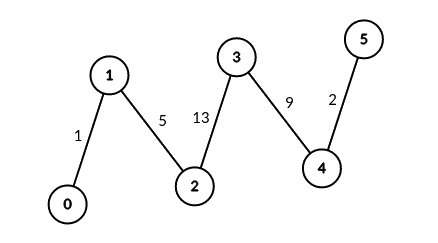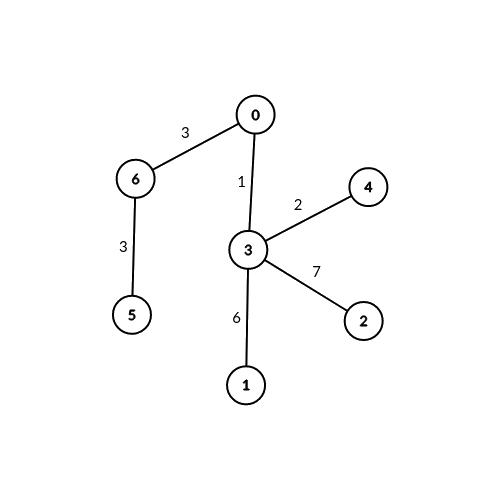Description
You are given an unrooted weighted tree with n vertices representing servers numbered from 0 to n - 1, an array edges where edges[i] = [ai, bi, weighti] represents a bidirectional edge between vertices ai and bi of weight weighti. You are also given an integer signalSpeed.
Two servers a and b are connectable through a server c if:
a < b,a != candb != c.- The distance from
ctoais divisible bysignalSpeed. - The distance from
ctobis divisible bysignalSpeed. - The path from
ctoband the path fromctoado not share any edges.
Return an integer array count of length n where count[i] is the number of server pairs that are connectable through the server i.
Example 1:

Input: edges = [[0,1,1],[1,2,5],[2,3,13],[3,4,9],[4,5,2]], signalSpeed = 1 Output: [0,4,6,6,4,0] Explanation: Since signalSpeed is 1, count[c] is equal to the number of pairs of paths that start at c and do not share any edges. In the case of the given path graph, count[c] is equal to the number of servers to the left of c multiplied by the servers to the right of c.
Example 2:

Input: edges = [[0,6,3],[6,5,3],[0,3,1],[3,2,7],[3,1,6],[3,4,2]], signalSpeed = 3 Output: [2,0,0,0,0,0,2] Explanation: Through server 0, there are 2 pairs of connectable servers: (4, 5) and (4, 6). Through server 6, there are 2 pairs of connectable servers: (4, 5) and (0, 5). It can be shown that no two servers are connectable through servers other than 0 and 6.
Constraints:
2 <= n <= 1000edges.length == n - 1edges[i].length == 30 <= ai, bi < nedges[i] = [ai, bi, weighti]1 <= weighti <= 1061 <= signalSpeed <= 106- The input is generated such that
edgesrepresents a valid tree.
Solution
Python3
class Solution:
def countPairsOfConnectableServers(self, edges: List[List[int]], signalSpeed: int) -> List[int]:
N = len(edges) + 1
graph = defaultdict(list)
for a, b, w in edges:
graph[a].append((b, w))
graph[b].append((a, w))
mp = defaultdict(int)
def go(node, prev, weight):
ans = 1 if weight % signalSpeed == 0 else 0
for adj, w in graph[node]:
if adj != prev:
ans += go(adj, node, weight + w)
return ans
res = [0] * N
for node in range(N):
curr = pairs = 0
for adj, weight in graph[node]:
if adj != node:
t = go(adj, node, weight)
pairs += curr * t
curr += t
res[node] = pairs
return res